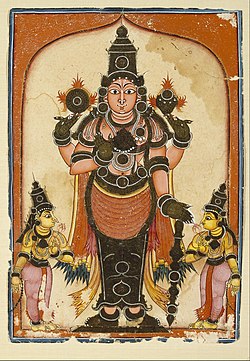Religion:Hari Stuti
From HandWiki
Short description: Hindu hymn in praise of Vishnu
| Hari Stuti | |
|---|---|
 Painting of Vishnu with his consorts, Sridevi (Lakshmi) and Bhudevi (Bhumi) | |
| Information | |
| Religion | Hinduism |
| Author | Adi Shankara |
| Language | Sanskrit |
| Verses | 44 |
The Hari Stuti (Sanskrit: हरिस्तुति, romanized: Haristuti), sometimes rendered the Harimide Stuti,[1] is a Sanskrit hymn written by the Hindu philosopher Adi Shankara. Comprising 44 verses,[2] the work is an ode to the deity Vishnu.[3]
Etymology
Hari is an epithet of Vishnu meaning 'the one who takes away' (sins), and stuti is translated as a hymn.[4]
Description
The Hari Stuti is regarded to have been composed by Adi Shankara during his stay in the Himalayas.[5]
Hymn
The first verse of the hymn extols the attributes of Vishnu:[6][7]
stōṣyē bhaktyā viṣṇumanādiṁ jagadādiṁ
yasminnētatsaṁsṛticakram bhramatittham
yasmin dṛṣṭē naśyati tatsaṁsṛticakraṁ
tam saṁsāradhvāntavināśaṁ harimīḍē
I praise, with devotion, the All-pervading (Vishnu), who, himself without origin, is the origin of the universe, in whom this wheel of samsara revolves in this wise, and, on realising whom, this wheel of samsara is destroyed— that Hari, the destroyer of the darkness of samsara, I praise.
See also
References
- ↑ Sankaranarayanan, S. (1995) (in en). Śrī Śaṅkara: His Life, Philosophy, and Relevance to Man in Modern Times. Adyar Library and Research Centre. pp. 309. ISBN 978-81-85141-14-5. https://books.google.com/books?id=e7rWAAAAMAAJ.
- ↑ Raghavan, Appaswamy Srinivasa (1991) (in en). The Life and Works of Sri Nigamanta Maha Desikan. K.R. Ramaseshan. pp. 47. https://books.google.com/books?id=xM8XAAAAIAAJ&q=sri+stuti+laksmi.
- ↑ Eck, Diana L. (2014-10-28) (in en). Encountering God: A Spiritual Journey from Bozeman to Banaras. Beacon Press. pp. 121. ISBN 978-0-8070-7304-9. https://books.google.com/books?id=WuzIBAAAQBAJ&dq=Haristuti&pg=PT121.
- ↑ Harder, Hans; Hüsken, Ute (2023-03-02) (in en). Zeitschrift für Indologie und Südasienstudien: Band 39 (2022). Helmut Buske Verlag. pp. 138. ISBN 978-3-96769-317-1. https://books.google.com/books?id=dtGxEAAAQBAJ&pg=PA138.
- ↑ Pande, Govind Chandra (1994) (in en). Life and Thought of Śaṅkarācārya. Motilal Banarsidass Publ.. pp. 99. ISBN 978-81-208-1104-1. https://books.google.com/books?id=nAiyujUqTwYC&pg=PA99.
- ↑ Chanting Books. pp. 81. http://archive.org/details/folder_202304.
- ↑ S. Venkata Ramanan. Select Works Of Sri Sankaracharya. pp. 8. http://archive.org/details/in.ernet.dli.2015.272557.
 |

